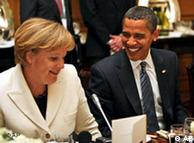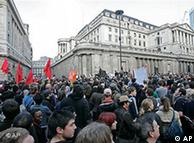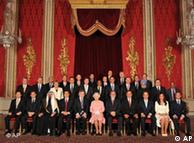POLITICS | 02.04.2009
More talks, less protests at G20 in London
US President Barack Obama was behind closed doors with 19 of his counterparts Thursday, attempting to hammer out a new agreement on boosting global economic confidence.
Obama pledged Wednesday to do all he could to face down the global recession, highlighting the consensus that had been reached among the G20 leaders in the run-up to the summit on the global economic crisis.
But at a joint press conference German Chancellor Angela Merkel and French President Nicolas Sarkozy threw down the gauntlet on market reform, insisting that the summit needed to act now to tighten the global regulatory system.
 Obama has a way to go in charming Merkel to his way of thinking.
Obama has a way to go in charming Merkel to his way of thinking.
The time for laying "the foundations for the new financial architecture is now," an unusually combative Merkel said.
Early word from the talks is that they may get their way, at least in part.
World leaders will publish a list of tax havens, in an effort to name and shame jurisdictions that abet tax evasion. Additionally, a deal to impose regulation on hedge funds is said to be all but sealed.
The two issues were among those upon which Merkel and Sakozy had insisted most adamantly in the run-up to the summit.
Leaders also look likely to triple the International Monetary Fund's emergency fund to fight the economic crisis, taking it from $250 to $750 billion.
Streets calmer
Protests simmered down on Thursday, with police reporting just a few hundred demonstrators gathered around the summit venue in the Docklands district.
It was a big contrast to Wednesday, when police said that 88 protestors were arrested and several officers were injured in clashes. One fatality was reported in the wake of the demonstrations, but the cause was not immediately clear.
Some 4,000 protestors converged with chants of "hang a banker" and "storm the banks" on the Bank of England and later vandalized the London headquarters of the Royal Bank of Scotland (RBS). Only a minority of the demonstrators were involved in the confrontation with police, reporters said.
Authorities reported that a man was found unconscious in the street Wednesday evening by a person who alerted police. The man was not breathing when two officers arrived at the scene, and they were pelted with bottles while attempting artificial resuscitation. Medics said that the man died while being transported to a hospital, according to British media.
A handful of protestors, their faces masked by bandanas, managed to enter the RBS building and gain access to the roof. The building was empty, though, as RBS workers had been advised to stay at home because of the protests.
 Several thousand demonstrators flooded the City streets Wednesday.
Several thousand demonstrators flooded the City streets Wednesday.
RBS, which reported record losses last year of 28 billion pounds, has been at the center of public anger during the banking crisis. Protestors cheered as an office chair was used to smash the large, blacked-out windows of the RBS building.
With a diverse mix of anti-war campaigners, anti-poverty groups, anarchists and climate change activists, demonstrators were penned in for hours as riot police and mounted officers were deployed. Some accused police of "going over the top" in their efforts to control the demonstrators, many of whom were "ordinary citizens" angered by the impact the financial crisis on their lives.
"I am here to make sure that peace happens rather than war," said Mirthful Merryweather, a nurse among the protestors.
Christine Hickey, 64, said: "I'm just fed up with the bankers who've got away with taking all this money. People are losing jobs and their homes, and I'm fed up with it."
One on one with Obama
In addition to a series of G20 working sessions, Obama held another round of bilateral meetings with leaders attending the summit.
That included talks with Indian Prime Minister Manmohan Singh and Saudi Arabian leader King Abdullah bin Abdul Aziz Al Saudi, who represent two of the leading emerging economies attending the summit. Saudi Arabia is also the world's biggest oil exporter.
Ahead of a breakfast meeting of the G20 leaders, Obama also met with South Korean President Lee Myung-bak. That meeting's focus was mostly on concerns about North Korea's nuclear ambitions.
mh/rm/sh/dpa/afp/rtre/ap

Comments